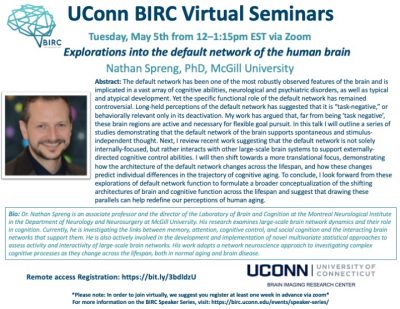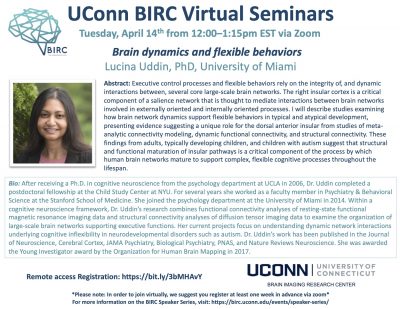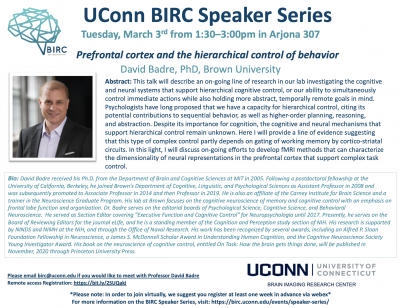Dear BIRC Community,
Many neuroscience conferences this year have moved to an online format due to the COVID-19 pandemic making them far more accessible while decreasing registration costs. Please see a collection of relevant events below. We hope that you are able to take advantage of these resources.
- World Wide Neuro
- Seminars on a wide range of Neuroscience topics, 3-5 times a week
- Additional information
- XhM Foundation Neuroscience for Kosovo
- May 12th, 2020
- $10 registration fee
- Additional information
- NeuroData Without Borders Hackathon
- May 12th-15th, 2020
- Free Registration
- “In contrast to conferences, where the primary focus is to report results, the objective of the Hackathon is to provide a venue for NWB users and tool developers to learn about NWB and collaboratively work on any NWB-related research projects. This event is meant to foster community and collaboration around NWB, not competition.”
- Additional information
- BIRC Special Virtual Seminars
- Typically every 2 weeks at 12pm ET
- Upcoming talks scheduled for May19th and 26th
- Schedule
- email elizabeth.collin@uconn.edu to receive talk updates
- Virtual Dopamine Conference
- May 20-22, 2020
- $5 Registration
- Additional information
- Neuro Technology Center: Optogenetics Symposium
- May 27th, 2020
- Free registration, closes May 13th
- Additional information
- Society for the Improvement of Psychological Science (SIPS)
- June 21-23
- Registration: free
- Likely it will involve some combination of content communicated via video (e.g., pre-recorded workshops) and other content that involves interactive video-conferencing (e.g., live hackathons). We will let you know more as this planning takes form, and are excited to see how this new meeting takes shape in the hands of both the SIPS leadership and the SIPS community.
- Additional information
- Gradients of Brain Organisation Virtual Satellite Event
- June 23
- “Early career researchers will take centre stage for a series of talks on state-of-the-art development and application of gradient approaches”
- Registration is free
- Additional information
- Scipy (Scientific Computing with Python) Conference
- July 6-12
- Students: $25 ; non students: $75
- The annual SciPy Conference brings together over 900 participants from industry, academia, and government to showcase their latest projects, learn from skilled users and developers, and collaborate on code development. The full program will consist of 5 days tutorials and talks (July 6-10) and 2 days of developer sprints (July 11-12).
- Additional information
- Neuromatch Academy
- “The Neuromatch Academy will be an open, online, 3-week intensive tutorial-based computational neuroscience training event (July 13-31, 2020). Participants from undergraduate to professors as well as industry are welcome”
- Deadline to register: May 7th, 2020 (TODAY), by Midnight
- Additional information
- Federation of European Neuroscience Societies Virtual Forum
- July 20-22, 2020
- Registration fees: €450 for non-member, €205 for student non-members
- Additional information
- Neuro HACKADEMY Summer School
- July 27th-31st, 2020
- “a summer school in neuroimaging and data science, held at the University of Washington eScience Institute.”
- Apply for registration
- Computational Psychiatry Course Zurich
- September 7th-12th, 2020
- This course is organized by the Translational Neuromodeling Unit (TNU) , University of Zurich & ETH Zurich and is designed to provide students across fields (neuroscience, psychiatry, physics, biology, psychology….) with the necessary toolkit to master challenges in computational psychiatry research.
- Practically useful for students at all levels (MDs, Master, PhD, Postdoc, PI) coming from diverse backgrounds (neuroscience, psychology, medicine, engineering, physics, etc.), who would like to apply modeling techniques to study learning, decision-making or brain physiology in patients with psychiatric disorders
- Free registration, closes August 23rd 2020
- (Will be held online, not Zurich)
- Registration


